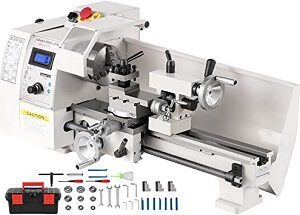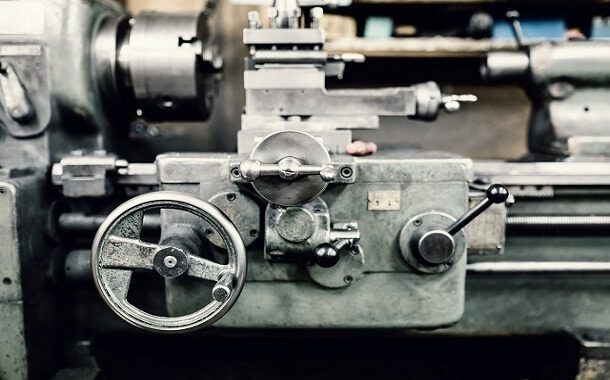Lathe Machine Cost
Lathe machine tools are equipment that processes a workpiece by rotating it around its axes to perform various machining operations, such as cutting, grinding, drilling, deformation, veneering, turning, etc. with the help of cutting tools that are applied directly on the workpiece and that create an object symmetrical to the axis of rotation.
Different models of lathes are for woodworking, metalworking, thermal spraying, or glass processing.
How Much Does a Lathe Machine Cost?
The cost of a lathe machine greatly depends on the purpose it is used for. The average price of a lathe machine that is used at home is anywhere between $90 and $1,300, while for a lathe machine that is used in a commercial factory setting you will have to pay more than $56,000.
For example, Sears has a Craftsman ½ hp 16” x 12” midi lathe machine for sale, that costs around $470 and a 22” x 10” top metal lathe machine that costs around $1,400. On the other hand, Lowe’s has lathe machines for sale that cost around $650.
In the table below you will find the average costs of different types of lathe machines.
| Type | Expected Price |
|---|---|
|
$100 |
|
$52,500 |
|
$22,000 |
|
$9,000 |
|
$6,000 |
|
$3,800 |
|
$3,000 |
Lathe machine details
Very complex machines, lathe machines are essential for machining metals and other materials.
 The main structure of a lathe machine is:
The main structure of a lathe machine is:
- The frame – provided with two support legs that fix the frame to the lathe foundation;
- Gearbox – the gearbox of the lathe that controls the optimal power transmission;
- Mobile doll – which can be used for centering workpieces using a centering tip or revolver head;
- The stroller – it supports the transverse sledge and the knife holder;
- Knife holder – fixes the cutting knives;
- Main shaft – it fixes the workpiece with the help of a universal or flanges.
As technology has evolved, numerical control has come to use as instructional support from punched cards to high-performance computers. When the numerical control equipment is based on a computer, it is called computer numerical control and has the well-known acronym CNC.
A CNC lathe consists of the lathe itself and computer numerical control equipment. For each of the two components, there is auxiliary equipment to ensure the interconnection. Among the major manufacturers of CNC lathe machines, we can mention EMCO, Knuth, DMG Mori Seiki, Hurco, etc.
Classification of lathe machines
The classification of lathes can be made taking into account the criteria:
- position of the main shaft axis: horizontal lathe and vertical lathes (carousel);
- degree of automation: manually operated lathes, semi-automatic lathes, automatic lathes, CNC lathes;
- degree of universality: universal lathes, specialized lathes, special lathes;
- weight and overall dimensions: bench lathes, small lathes, medium lathes, heavy lathes, very heavy lathes;
- degree of accuracy: normal precision lathes, precision lathes.
You might also like our articles about the cost of metal fabrication, steel I beam or Standing seam metal roofing.
Operations that can be performed with a lathe machine:
- woodturning (with lathe knives)
- drilling (with a drill);
- widening (with a drill or widener);
- deepening (with the deepener or the knife);
- smoothing (with a rolling pin or a knife);
- reaming (with a reamer or knife);
- threading (with the tap or with the knife);
- rectification;
- even milling – if the milling cutter is fixed to the main shaft, and the semi-finished product on the transverse sleigh or directly on the trolley.
Major categories
- Woodworking
- Cue
- Watchmaker’s
- Duplicating
- Rotary
- Glass-working
- Reducing
- Metalworking
- Patternmaker
- Metal-spinning
What are the extra costs?
If the piece you are working with does not have a tapering machine on it you will have to purchase an accessory in order to mount the workpiece to a spindle.
You will also need a faceplate in order to secure the work to the machine. Though, it can be mounted on a mandrel as well. This is an accessory that clamps the workpiece instead. The piece can be held in a collet if it is cylinder-shaped.
You should take into consideration the shipping costs as well. Because of the large size and the fact that most of the lathe machines are delivered from China, some online sellers apply high shipping fees. A professional installation will also be necessary to make sure that everything will work properly.
Important things to consider
The batten is the largest component of a lathe. Many times, if the batten is twisted or broken, the lathe is gone. This component is very straight and extends over the entire length of the machine.
The types of parts that can be processed on the lathe are those parts that have revolutionary surfaces, cylindrical, conical or profiled, inner or outer, respectively threaded surfaces. It does not mean that the piece must be entirely a piece of revolution in order to be processed on the lathe. It can have only one revolution surface, and the rest to be polygonal surfaces, in which case the device for fixing the semi-finished product on the lathe will be one adapted for this purpose. The lathe in combination with certain devices has also been used in processes such as alignment, spring rolling, vibro-smoothing processing, etc. making it a very versatile machine tool.
How can I save money?
Take into consideration buying a used lathe machine because this way you may be able to save more than 40%on the whole price of such a machine.


Leave a Reply
Want to join the discussion?Feel free to contribute!